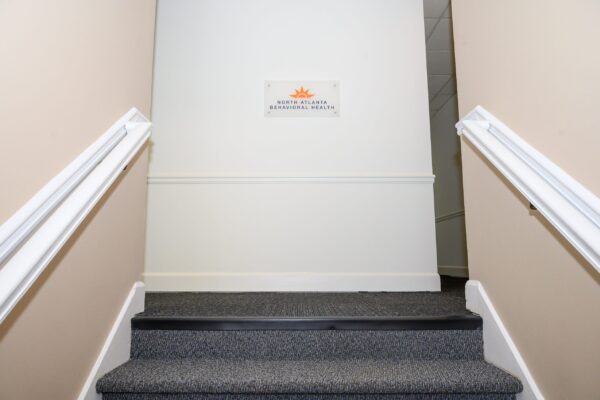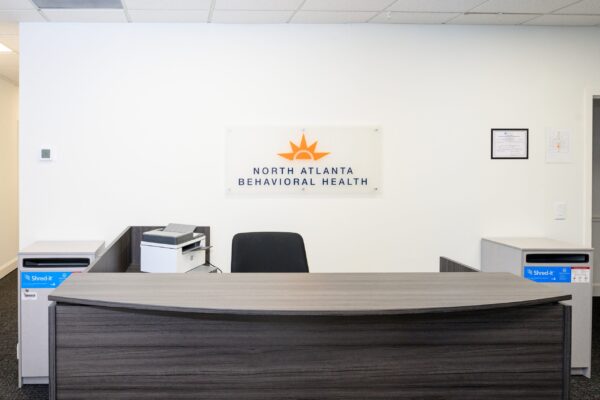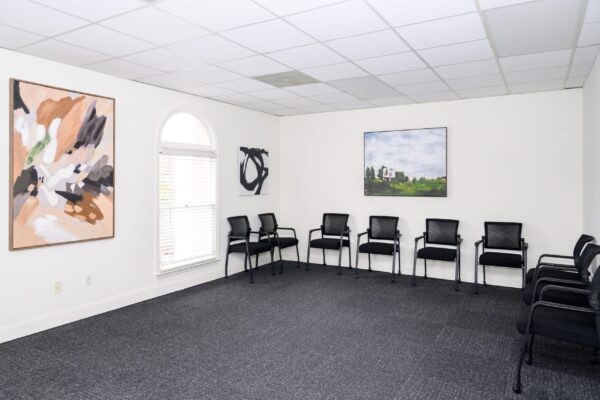What is Outpatient Mental Health Treatment?
Outpatient mental health treatment in Atlanta is a form of therapy that allows individuals to receive care without the need for overnight hospitalization. Clients can attend scheduled sessions with mental health professionals and return home or to work afterward.
This type of treatment is ideal for those who require ongoing support but have work, school, or family commitments that make inpatient care impractical.
Structure of Outpatient Mental Health Treatment
Outpatient treatment typically involves scheduled appointments with mental health professionals, such as therapists, psychiatrists, psychologists, or social workers. Sessions can occur in various settings, including mental health clinics, hospitals, private practices, or community health centers.
The primary goals of outpatient mental health treatment are to alleviate symptoms, improve mental health and well-being, enhance coping mechanisms, and support individuals in managing their daily lives more effectively.
How Does Outpatient Treatment Work?
Outpatient treatment is a flexible and effective approach to mental health care that allows individuals to receive professional support while maintaining their daily routines.
The frequency and duration of outpatient mental health treatment can vary widely. Some individuals may attend therapy sessions once a week, while others may participate in more intensive programs that require multiple sessions per week. The length of treatment also depends on the individual’s progress and goals, with some people benefiting from short-term therapy, while others may engage in long-term care.
Overall, outpatient treatment is the lowest form of care that provides a structured yet flexible approach to mental health care, allowing individuals to work on their mental health while continuing to engage in their everyday lives.
Initial Assessment
The first step in outpatient treatment is a comprehensive assessment conducted by a mental health professional. This evaluation helps to understand the individual’s specific needs, mental health history, and any underlying issues that need to be addressed. Based on this assessment, a personalized treatment plan is developed.
Individual and Group Therapy
Central to outpatient treatment are regular therapy sessions. One-on-one sessions with a therapist focus on exploring personal issues, developing coping strategies, and working through emotional challenges.
Group sessions provide a supportive environment where individuals can share experiences, learn from others, and develop social skills. Topics might include stress management, relationship building, or specific mental health concerns.
Family Therapy
In some cases, involving family members in therapy sessions can be beneficial. Family therapy helps address relational issues and improve communication and support within the family unit.
Medication Management
If medications are part of the treatment plan, regular appointments with a psychiatrist or psychiatric nurse practitioner are necessary. These sessions ensure that medications are effectively managing symptoms and that any side effects are monitored and addressed.
Specialized Therapies
Depending on the individual’s needs, specialized therapies such as cognitive-behavioral therapy (CBT), dialectical behavior therapy (DBT), brainspotting, or eye movement desensitization and reprocessing (EMDR) may be incorporated into the treatment plan.
Support Services
Outpatient treatment may also include access to support services such as case management, vocational counseling, or wellness activities. These services aim to support the individual’s overall well-being and help them manage aspects of their life that may be impacted by their mental health.
Regular Review
The treatment plan is regularly reviewed and adjusted as needed. Progress is assessed, and any changes in the individual’s condition or circumstances are taken into account to ensure that the treatment remains effective and relevant.
Types of Outpatient Treatment We Offer
At North Atlanta Behavioral Health, we offer two main types of outpatient mental health treatment in Atlanta. The best option for you will depend on your unique clinical needs. Generally speaking, clients begin with partial hospitalization and transition into intensive outpatient treatment after several weeks.
Partial Hospitalization Program (PHP)
The Partial Hospitalization Program (PHP) is a highly structured form of outpatient mental health treatment designed to provide an intensive level of care for individuals who are experiencing significant mental health challenges.
#1. Intensity and Duration:
- PHP typically involves attending treatment sessions for 5 to 7 days a week, with each day consisting of several hours of therapy and support (usually between 4 to 8 hours).
- The duration of the program can vary depending on the individual’s needs and progress, but it often ranges from a few weeks to several months.
#2. Goals:
- The primary goals of PHP are to stabilize the individual’s mental health condition, reduce the risk of hospitalization, and provide a supportive environment for recovery.
- The program aims to equip individuals with the skills and strategies needed to manage their symptoms effectively and transition to a less intensive level of care.
#3. Supportive Environment:
- PHP offers a supportive and structured environment where individuals can receive intensive care while still maintaining some level of independence.
- Participants have the opportunity to interact with peers who are facing similar challenges, fostering a sense of community and mutual support.
#4. Transition to Lower Levels of Care:
- As individuals progress in their recovery, they may transition from PHP to a less intensive outpatient program, such as an Intensive Outpatient Program (IOP) or traditional outpatient therapy.
- The treatment team works closely with each individual to develop a personalized discharge plan that supports their ongoing mental health needs.
Partial Hospitalization is a comprehensive and intensive form of outpatient treatment that provides a high level of support and care for individuals with significant mental health challenges, serving as a bridge between inpatient care and traditional outpatient therapy.

Intensive Outpatient Program (IOP)
The Intensive Outpatient Program (IOP) is a form of outpatient mental health treatment designed to provide a structured and supportive environment for individuals who require more support than traditional outpatient therapy but less intensity than a Partial Hospitalization Program (PHP).
#1. Schedule and Frequency:
- IOP typically involves attending therapy sessions for 3 to 5 days a week, with each session lasting about 3 to 4 hours.
- Sessions are often scheduled during the evenings or on weekends to accommodate individuals who have work, school, or other daytime commitments.
#2. Types of Services Offered:
- Group Therapy: The core of IOP is often group therapy, where participants engage in discussions and activities focused on topics such as coping skills, relapse prevention, stress management, and interpersonal relationships.
- Individual Therapy: While group therapy is a primary component, many IOPs also offer individual therapy sessions to address personal issues and provide tailored support.
- Family Involvement: Some programs include family therapy or family education sessions to enhance support systems and improve family dynamics.
- Medication Management: For individuals on psychiatric medications, regular meetings with a psychiatrist or psychiatric nurse practitioner may be part of the program.
#3. Goals:
- The primary goals of IOP are to provide a supportive environment for recovery, prevent relapse, and help individuals transition from more intensive levels of care to independent living.
- The program aims to equip participants with the skills and strategies needed to cope with stressors, manage symptoms, and maintain stability in their daily lives.
#4. Flexibility:
- The flexibility of IOP allows participants to continue with their daily responsibilities, such as work or school, while still receiving the support and treatment they need.
- This balance between treatment and everyday life is a key feature of IOP, making it a suitable option for many individuals seeking mental health care.
IOP is a versatile and structured form of outpatient treatment that provides a moderate level of support for individuals transitioning from higher levels of care or those needing more assistance than traditional therapy sessions can offer.
How Do I Know I’m a Good Fit for Outpatient Mental Health Treatment in Atlanta?
Outpatient mental health treatment in Atlanta is not right for everyone. In some cases, a person will require more intensive care. In other cases, when a mental health concern is easily managed, outpatient treatment might not be necessary.
Outpatient mental health treatment may be a good fit for you if:
- You have a stable living environment and a supportive network.
- You can manage your symptoms with periodic check-ins and therapy sessions.
- You are committed to attending scheduled appointments and actively participating in your treatment plan.
- You need to maintain your work, school, or family commitments while receiving treatment.
Outpatient mental health treatment is suitable for individuals who have a stable living environment, a supportive network, and the ability to manage their symptoms with periodic professional support.

Types of Mental Health Disorders We Treat
According to the Centers for Disease Control and Prevention (CDC), “More than 1 in 5 US adults live with a mental illness.” This means that mental health disorders are much more common than many people realize. Fortunately, mental health disorders are treatable conditions.
Our outpatient mental health services in Atlanta are designed to treat a wide range of mental health disorders, including:
- Anxiety disorders
- Depression
- Bipolar disorder
- Post-traumatic stress disorder (PTSD)
- Obsessive-compulsive disorder (OCD)
- Eating disorders
- Personality disorders
Benefits of Outpatient Mental Health Treatment in Atlanta
When seeking treatment for a mental health concern, there are many benefits that go hand-in-hand with committing to a more flexible level of care.
Benefits of outpatient mental health treatment in Atlanta include:
- Flexibility: Outpatient treatment allows individuals to receive care without disrupting their daily routines, such as work, school, or family responsibilities.
- Accessibility: Atlanta offers a wide range of outpatient mental health services, making it easier for individuals to find a program that suits their needs.
- Cost-Effective: Outpatient treatment is generally more affordable than inpatient care, making it a more accessible option for many people.
- Personalized Care: Outpatient programs in Atlanta often provide personalized treatment plans that are tailored to the individual’s specific needs and goals.
- Support Networks: Many outpatient services offer group therapy sessions, providing individuals with the opportunity to build support networks with others who are facing similar challenges.
- Continuity of Care: Outpatient treatment allows for ongoing support and care, which can be crucial for long-term recovery and management of mental health conditions.
- Integration with Daily Life: Outpatient care encourages individuals to apply coping strategies and skills learned in therapy to real-life situations, promoting practical and sustainable improvements.

By NABH Staff
Medically Reviewed by
Erika Dalton, LMSW.
Last Updated on March 18, 2024
Get Help Now
Begin Depression Treatment in Atlanta Today
Mental health disorders cannot be treated by treating the symptoms alone. We use holistic and evidence-based methods to treat the entire individual.
Facility Image Gallery
Find Outpatient Mental Health Treatment in Atlanta
If you or a loved one is seeking outpatient mental health services in Atlanta, CRG is here to help. Our experienced team is dedicated to providing compassionate and effective care tailored to your individual needs.
Contact us today to learn more about our outpatient programs and how we can support you on your journey to mental wellness.

Treatment Philosophy
North Atlanta Behavioral Health is dedicated to the health and happiness of our clients. We offer personalized treatment plans that put each individual’s needs first.

Meet Our Team
Our multidisciplinary team wants nothing more than for our clients to achieve a lifetime of recovery and sobriety. Let us help you get the most out of treatment.













 I have been to my fair share of mental health programs and this one was extremely small, intimate and every staff member I have ever had contact with has been completely professional, compassionate, and caring.
I have been to my fair share of mental health programs and this one was extremely small, intimate and every staff member I have ever had contact with has been completely professional, compassionate, and caring.










